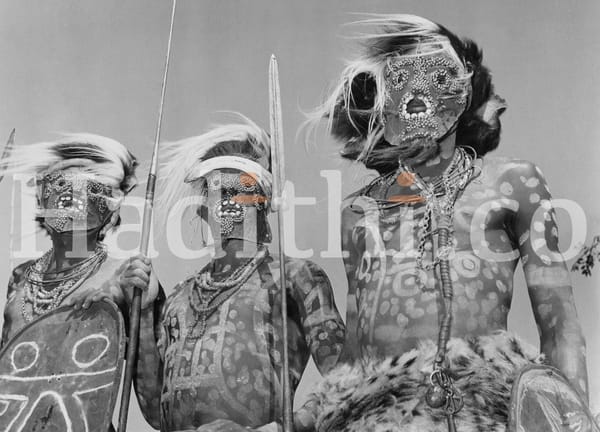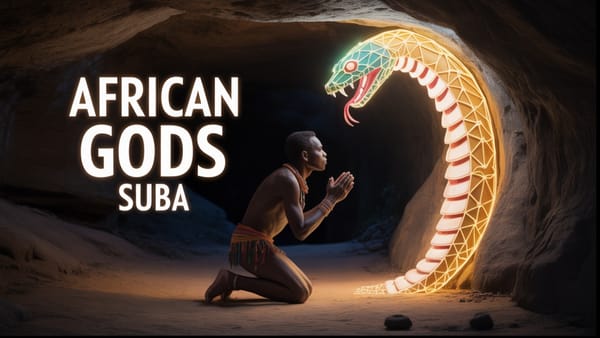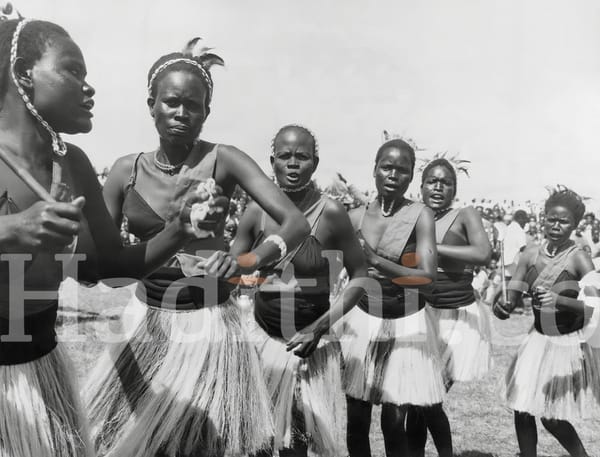AFRICAN GODS: THE KAMBA TRIBE

Understanding the Kamba People: Culture, Beliefs, and Practices
The Kamba, also known as the Akamba, are a vibrant Bantu ethnic group primarily residing in the eastern region of Kenya. With a population of approximately 4.6 million as of the 2019 national census, they rank as the fifth-largest tribe in the country. This article delves into the Kamba people's origins, language, culture, and rich spiritual beliefs, particularly focusing on their god, Mulungu.
Who Are the Kamba?
Origins and Language
The Kamba people, speaking the Kikamba language, share deep cultural ties with neighboring ethnic groups such as the Kikuyu, Embu, Mbeere, and Meru. Most Kamba are found in Machakos, Makueni, and Kitui Counties, collectively referred to as "Ukambani." This region is characterized by rolling hills, fertile land, and a rich tradition of agriculture that sustains the community. In addition to their presence in Kenya, some Kamba have migrated to the coastal regions and even as far as Uganda, Tanzania, and Paraguay, where they continue to maintain their cultural identity.
Notable Figures
Among the notable Kamba figures are:
● Chief Kivoi: Renowned for his pivotal role in assisting Christian missionaries during the colonial period, aiding in the spread of education and Christianity among the Kamba.
● Syongu: A powerful prophetess and medicine woman known for her deep spiritual insights and healing practices that have been passed down through generations.
● Prophetess Syokimau: A significant spiritual leader who prophesied important events, protecting her community through foresight and guidance.
● Muindi Mbingu: An influential figure in the Mau Mau movement, advocating for independence and justice during Kenya's struggle against colonial rule.
The Name of Their God: Mulungu
The Kamba believe in one supreme god, known as Mulungu (or Mlungu). This deity is perceived as male and credited as the sole creator of everything on Earth. Mulungu is considered invisible and omnipotent, residing in the sky, referred to as ituni.
Attributes of Mulungu
Mulungu embodies several key attributes that reflect the Kamba's understanding of divinity:
- Omnipotence: As the all-powerful creator, Mulungu is able to control all aspects of the universe. The Kamba view him as the ultimate source of blessings and provisions, a belief that shapes their worldview and daily practices.
- Mercy: Known as the "God of Comfort," Mulungu is viewed as merciful and compassionate. He is believed to act only for the good of his people, instilling a profound sense of gratitude and trust in divine providence.
invokes - Protector: The Kamba see Mulungu as the protector of their community, ensuring their safety from harm and misfortune. During times of crisis, the Kamba often invokes his name, seeking guidance and support.
- The Rain Giver: Rain is considered sacred and is often referred to as the "saliva of God." The Kamba believe that Mulungu controls the rains, which are vital for their agricultural lifestyle. To spit on something, such as a child, symbolizes a great blessing as it is believed to invoke divine favor.
- Creator: As the creator of all things, Mulungu is revered for his role in the origins of humanity and the natural world. The Kamba believe that both heaven and earth belong to him, emphasizing his ultimate authority.
How Did They Come Up with the Name?
The name "Mulungu" reflects the Kamba's understanding of God as a powerful and merciful creator. Other local names for God include:
● Asa: Referring to the strong God.
● Mumbi: Meaning 'fashioner' or 'maker.'
● Mwatuangi: Meaning 'distributor' or 'cleaver.'
These names highlight various attributes of Mulungu, emphasizing his role in creation and sustenance.
The Kamba Creation Story
The Kamba creation story is a profound narrative that explains the origins of humanity and the universe. According to Kamba beliefs, Mulungu created the first man and woman and placed them on a rock called nzaui. This rock symbolizes stability and foundation.
After creating the first couple, Mulungu sent rain, which was vital for life. From the earth, he brought forth a man and a woman from an anthill, believed to be the initiators of the spirit clan known as aimo. The couple from heaven was seen as divine, while the couple that emerged from the earth was seen as earthly beings.
The heavenly couple had only sons, while the earthly couple had only daughters. The sons from heaven paid dowry for the daughters from earth, thus forming the original descendants of the Kamba community. This narrative emphasizes the connection between the spiritual and physical worlds, showcasing the Kamba belief in a harmonious balance of creation.
Worship Practices
How Do They Worship Mulungu?
The Kamba do not confine their worship to specific places or times. Instead, they believe that Mulungu is omnipresent and accessible anywhere. However, they gather at sacred groves or shrines called mathembo during significant occasions to perform sacrifices and offer prayers.
Places of Worship
The sacred groves, or mathembo, are crucial in Kamba spirituality. These spaces are considered sanctuaries for both animal and plant life, often featuring specific trees such as the kiumo. The Kamba believe that:
● Accessibility: Mulungu is always accessible; therefore, worship can occur at any time and place. However, special gatherings at mathembo are reserved for significant events.
● Ceremonial Importance: During ceremonies such as the thanksgiving harvest, the community performs the sacred kilumi dance, accompanied by drums and vocals. This dance signifies gratitude and a profound connection to nature, embodying the community's appreciation for Mulungu's blessings.
● Protection of Sacred Spaces: The sacred grove must never be cut down. If it is damaged, the offender must pay a fine in livestock to ritually cleanse the grove, emphasizing the community's respect for their spiritual environment.
Rituals and Offerings
The Kamba community engages in various rituals, especially during significant life events like rites of passage and harvests. They often offer sacrifices of oxen, sheep, or goats. In dire circumstances, such as severe droughts, they historically sacrificed a child, a practice that underscores the depth of their beliefs.
Sacrifice of a Child
The sacrifice of a child, though rare and viewed with deep sorrow, was performed during extreme crises, such as prolonged drought or famine. This act was believed to appease the spirits and invoke God's favor for rain and fertility. The community viewed this sacrifice as a last resort, emphasizing their reliance on divine intervention for survival. Such sacrifices were conducted with great reverence, often involving elaborate rituals to ensure that the child was honored, with prayers and offerings presented to seek forgiveness for this grave act.
The Role of Ancestors and Spirits
Ancestors as Intermediaries
The Kamba also believe in spirits, referred to as kiimu, and honor their ancestors through intermediaries like Musumbi, a deity associated with the ancestral spirit world. The community holds that:
● Mediation: Ancestors are considered crucial intermediaries who solicit favors from Mulungu on behalf of the living. They believe that the ancestors help maintain a connection between the physical world and the spiritual realm.
● Rituals of Remembrance: The Kamba engage in rituals to honor their ancestors, ensuring that their legacies are remembered and respected. These rituals often involve offerings and prayers at family shrines, reinforcing the bonds between generations.
The Role of Spirits
Spirits also play a significant role in Kamba spirituality. The Kamba differentiate between good and evil spirits:
● Good Spirits: These are believed to be messengers of Mulungu and are honored in family rituals. They are associated with blessings, protection, and guidance, often invoked during important life events.
● Evil Spirits: Often linked to misfortunes, these spirits can cause illness or hardship. To appease them, families may perform rituals that include pouring libations, typically using traditional brews, to seek forgiveness and restore balance.
Divination and Medicine
Spirituality in Divination
Diviners and medicine people among the Kamba play crucial roles in diagnosing and treating illnesses. Their practices are deeply intertwined with spirituality, as they serve as mediators between the physical and spiritual worlds.
The Role of Medicine Men and Women
- Healing Practices: Kamba medicine men and women, known as mganga, are revered for their ability to diagnose ailments and provide remedies. They often attribute illnesses to spiritual causes, such as angered ancestors or malevolent spirits, and employ a combination of herbal treatments and spiritual healing.
- Community Trust: The community places significant trust in these healers, believing that their spiritual insights can reveal the underlying causes of physical and emotional ailments. This trust is rooted in centuries of tradition and shared experiences, where healers have played pivotal roles in community well-being.
- Rituals and Offerings: Healing practices often involve rituals that include animal sacrifices, herbal remedies, and prayers. The healer may call upon ancestors or spirits for guidance in treating a patient, ensuring that the healing process is holistic and spiritually grounded.
Divination Tools
The divination process often involves tools such as:
● The Divining Rod: Used to locate water or diagnose illnesses, believed to point towards the source of problems.
● Calabashes: Used for mixing herbal remedies and conducting rituals, often decorated with symbols that hold spiritual significance.
● Cowrie Shells: Sometimes employed in casting for guidance on decisions, the patterns formed by the shells are interpreted for insights.
● Herbs and Roots: Specific plants are utilized in healing and divination rituals, each chosen for their unique properties and spiritual meanings.
Diviners use these tools to interpret signs from the spiritual world, helping individuals and families navigate challenges and make important decisions.
Famous Diviners
One famous medicine woman, Syokimau, was known for her prophetic abilities and contributions to the community's awareness of external threats. She would inform the community of impending dangers, allowing them to prepare and protect themselves, thereby reinforcing the importance of divination in maintaining social cohesion and security.
Conclusion
The Kamba people's rich cultural heritage, deep spiritual beliefs, and connection to their environment reflect a unique worldview. Through their worship of Mulungu and reverence for ancestral spirits, the Kamba maintain a vibrant community that honors both their past and present. Understanding their culture provides valuable insights into the diversity and richness of Kenya's ethnic groups, highlighting the intricate relationships between spirituality, community, and identity that define the Kamba way of life.



